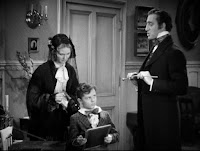“Even when the lessons are done, the worst is yet to happen, in the shape of an appalling sum. This is invented for me, and delivered to me orally by Mr. Murdstone, and begins, ‘If I go into a cheesemonger’s shop, and buy five thousand double-Gloucester cheeses at fourpence-halfpenny each, present payment’ — at which I see Miss Murdstone secretly overjoyed. I pore over these cheeses without any result or enlightenment until dinner-time, when…I have a slice of bread to help me out with the cheeses, and am considered in disgrace for the rest of the evening.”—English novelist Charles Dickens (1812-1850), David Copperfield (1850)
It's been nearly 50 years since I read David
Copperfield, and with this novel so teeming with incidents and characters—and
similarly lengthy Charles Dickens works I have read since—this particular episode
involving the title hero, his wicked stepfather, and the latter’s only-slightly-less
villainous sister had long since receded well back into my memory.
Then, about two weekends ago, as if in answer to one
of my viewing prayers, TCM ran the wonderful 1935 adaptation of Dickens’ semi-autobiographical classic, produced by David O. Selznick and directed by George Cukor. It’s a
model not just of terrific casting (W.C. Fields, most prominently, as Wilkins
Micawber), but of editing a sprawling novel down to its essentials in just two
hours of running time.
This scene stood out for me. David’s humiliation and
fear on the page are not only captured but heightened on the screen, with fast
cuts among David, his anxious mother, her goading sister-in-law, the smooth
suitor turned household tyrant, and the whip that the latter carries and shortly
uses on his stepson.
In addition, there’s a short addition of dialogue that
I think would have further pained audiences that first saw this in movie
theaters.
Right after Murdstone (played by Basil Rathbone, captured here in despicable perfection with Freddie Bartholomew as David and Elizabeth Allan as Mrs. Copperfield) mentions a “halfpenny each,” he continues, “And if I sell half of them at six pence-halfpenny, twenty at five pence, and use the rest myself, do I make a profit or loss?"
“Profit or less” would have been uppermost on the minds
of Depression-era youthful moviegoers. Imagine them trying to quickly do this
sum in their heads, floundering, and wondering how their inadequacy with this math
might have contributed to their own failure to barely stay solvent.
Even now, the scene has a kind of horror for kids today,
I think—not so much for the beating David endures at the hands of
Murdstone (so sadistic that an unnerved Rathbone required several takes to get it right), but for what leads to it. The question is all too close to those
word problems not only in algebra tests but also in standardized math tests taken by
high school students of the postwar era.
Those of us who don’t recall those word problems with
a shudder chuckle at jokes we’ll occasionally come across about them. (For instance,
from Charlie Brown’s sister Sally in “Peanuts”: “Only in math problems can you
buy 60 cantaloupes and no one asks what the hell is wrong with you.”)
“I have in my heart of hearts," wrote Dickens of
the novel closest to him, "a favorite child and his name is David
Copperfield." Let nobody forget that math was among the multiple traumas endured
by this beleaguered orphan—and by no means the least.
(For more about Dickens’ pungent feelings and writings
about math and education in general, try Brittany Carlson’s November 2020 blogpost for the Dickens Society.)

No comments:
Post a Comment